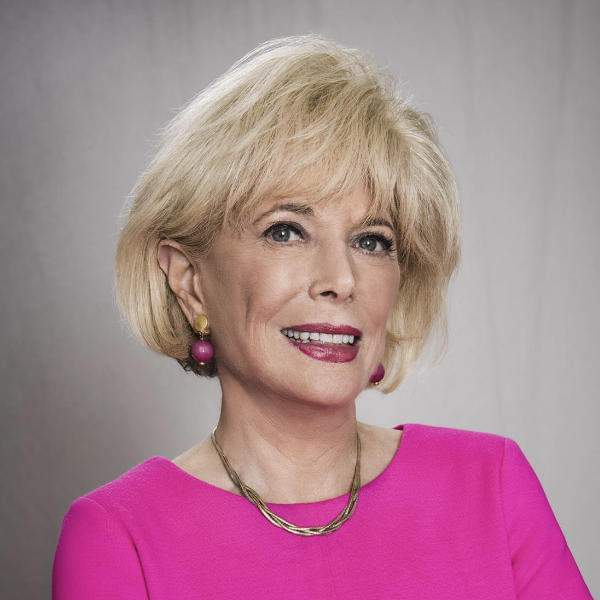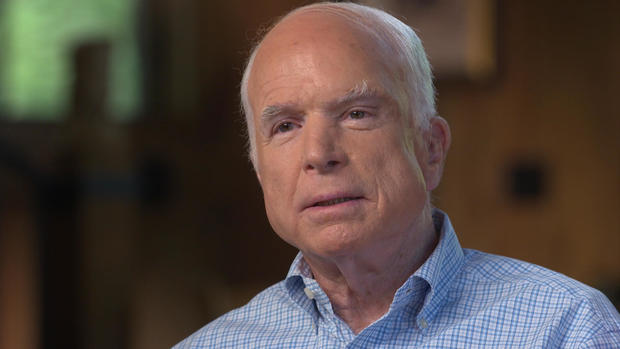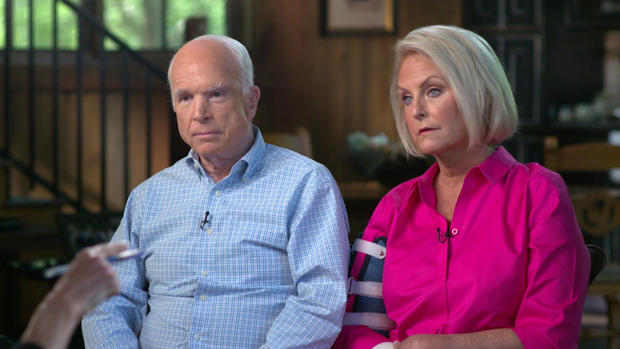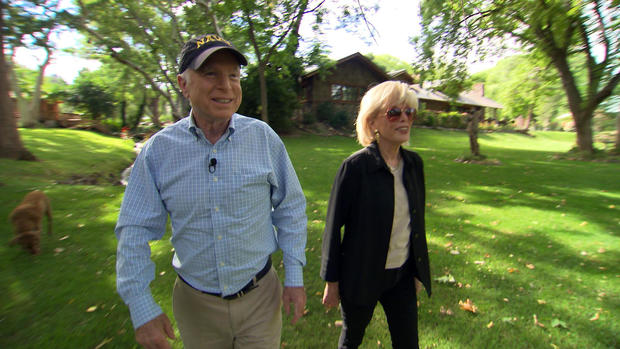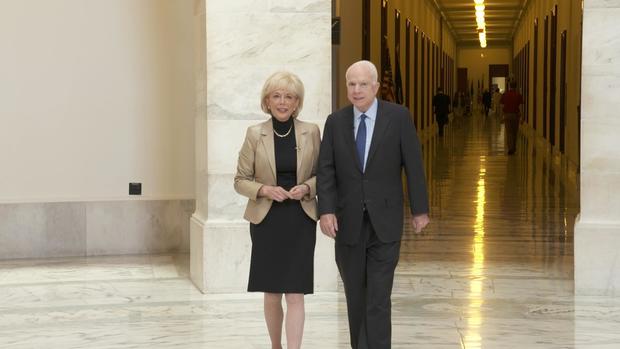John McCain: The 2017 60 Minutes interview
Editor's Note: For more from Lesley Stahl's interview with Sen. John McCain, click here.
Yesterday, Sen. John McCain died 4 days short of his 82nd birthday. He faced death the way he faced life - with valor, honor and integrity.
John McCain served his country for over 60 years, as a naval officer, a prisoner of war, a congressman, a six-term senator and a presidential candidate.
Over that time, he became a national treasure -- occasionally ornery and profane, but a politician who placed principle over party and earned his reputation as a fighter and a maverick.
In July 2017, Sen. McCain learned he had glioblastoma - a deadly and unforgiving brain cancer. Our Lesley Stahl joined him for some straight talk about how he lived his life and faced his death.
Last summer, he invited us to his ranch just outside of Sedona, Arizona, 24 acres of old-growth trees, a family of hawks and a rippling creek that his dog Burma likes to swim in.
Lesley Stahl: I'm wondering if when you're up here if it's like medicine for you.
John McCain: Oh yeah, oh yeah. It puts everything in perspective.
He and his wife Cindy raised four children. They survived two grueling presidential campaigns, a battle against melanoma – and then this.
Lesley Stahl: You're taking both radiation and chemotherapy?
John McCain: Yep.
Lesley Stahl: You look terrific. How is this possible?
John McCain: I feel fine and I'm eating everything that she makes me eat, all of which-- none of which is--
Lesley Stahl: Is any good?
John McCain: Yeah, exactly. One criteria to feeding people that are under my situation, it has to taste lousy.
Lesley Stahl: He has been through so much?
Cindy McCain: Uh-huh (affirm).
Lesley Stahl: I mean, the torture and the-- you were put in solitary confinement?
Cindy McCain: Uh-huh (affirm).
Lesley Stahl: He's always been the indestructible man?
Cindy McCain: Uh-huh (affirm).
John McCain: Crashed two airplanes.
Lesley Stahl: Crashing two airplanes and walked away?
John McCain: Yeah.
Lesley Stahl: Is he still the indestructible man to you?
Cindy McCain: I'm still in disbelief that this actually has happened. And then I think, you know, cancer chose the wrong guy. 'Cause there-- it's not gonna happen here.
Determined to stay in the arena, Sen. McCain resumed his duties in Washington. You'd never have know it, but he started his days with chemo and radiation. And then headed off to a full day of work, including chairing hearings of the Armed Services Committee.
John McCain: I am more energetic and more engaged as a result of this because I know that I've got to do everything I can to serve this country while I can.
Lesley Stahl: Now you have the same cancer that Ted Kennedy had. Does what he experienced go through your mind? Is it--
John McCain: Oh, yeah. I think about Ted a lot. Ted stayed at his job, kept working. Kept going even when he was in a wheelchair. And he never gave up because he loved the engagement.
The senator first learned he had a problem in Arizona last July when doctors found a blood clot over his left eye after a routine check up at the Mayo Clinic in Phoenix. He was driving back to the ranch when he got word.
John McCain: I was driving up here, and I got about two-thirds of the way up. And my doctor called and said, "You've got to come back." And I said, "Hey, today's Friday. I'll just come in on Monday." And she said, "No, you have to come now. It's very serious."
Lesley Stahl: You turned the car around?
John McCain: Uh-huh (affirm).
Lesley Stahl: And went immediately into surgery?
John McCain: Yes. They thought it was serious enough that they had to act immediately.
Lesley Stahl: And before the blood clot operation, did they mention glioblastoma to you?
John McCain: Yes. But, as you know, doctors are interesting.
Lesley Stahl: They cover themselves.
John McCain: I kept saying to them, "Tell it to me straight." "Well, there's always this. There's always that." You know, and-- and I said, "I can take it. Just tell me." And then they were more forthcoming.
Five days after the surgery, lab results confirmed he had glioblastoma, the brain cancer that took his life.
Lesley Stahl: What did they tell you about the prognosis?
John McCain: They said that it's very serious. That the prognosis is very, very serious. Some say three percent, some say 14 percent. You know, it's a very poor prognosis. So I just said, "I understand. Now we're gonna do what we can, get the best doctors we can find and do the best we can." And, at the same time, celebrate with gratitude a life well lived.
Lesley Stahl: Was he that tough?
Cindy McCain: Yes. He is that tough.
Just 11 days after his surgery, he returned to Washington – against doctors' advice – for the vote to repeal Obamacare.
Lesley Stahl: You walk out onto the Senate floor. You thought it was gonna be normal, empty, mostly empty. And the entire Senate is there. They stand up. They give you an incredible ovation. What went on inside--
John McCain: Oh, I got very choked up. And then, of course, you know, all of 'em coming over and giving me a hug. It was deeply moving. I had never seen anything like that.
Lesley Stahl: So you get all this affection. And then you give them this speech kinda scolding to the people who just stood up and loved you. This was a speech condemning the way the Senate has been operating.
McCain's Senate speech: We're getting nothing done my friends. We're getting nothing done because we keep trying to find a way to win without help from across the aisle.
Two days later, as the repeal Obamacare vote was underway, McCain was subjected to urgent lobbying by Vice President Pence and the president himself, over the phone. And yet, at 1:29 a.m., McCain delivered the dramatic and decisive "thumbs down." As a dejected Majority Leader Mitch McConnell bowed his head.
It was a huge defeat for President Trump -- who had mocked McCain's Vietnam War record.
President Trump: He's not a war hero. He's a war hero – he's a war hero because he was captured. I like people that weren't captured, OK.
Lesley Stahl: There are some people who think that part of your "no" was to get back at the president and that the thumbs down was kind of more like a middle finger to him.
John McCain: If I took offense at everybody who has said something about me, or disparaged me or something like that-- life is too short. You've gotta move on. And on an issue of this importance to the nation, for me to worry about a personal relationship, then I'm not doing my job.
But the fact is his personal relationship with the president had been fraught. Last summer, he wrote an op-ed saying the president is, quote "often poorly informed" and "can be impulsive."
Lesley Stahl: Do you worry that he's not fit for the office?
John McCain: First of all I believe in our system. The American people selected Donald Trump to be president of the United States. We have to respect that. Second of all, he has a very strong national security team around him who I know has significant influence over him.
Lesley Stahl: How would you describe how the president is handling his job so far?
John McCain: I think he's handling it in a fashion that is unfortunately not predictable. The one thing your friends and your enemies want is a predictable path. Lesley, he changes his, his statements almost on a daily basis. I don't know what he's gonna do tomorrow (LAUGH). So—or say tomorrow.
Lesley Stahl: Did he ever apologize for saying you're not a hero?
John McCain: No.
Lesley Stahl: If the president wanted to have a rapprochement with you, would you be receptive?
John McCain: Of course. Of course. I've supported him on national security. I've supported his team--
Lesley Stahl: But personal. I'm talking about man to man--
John McCain: Personal? Sure. I'd be glad to converse with him. But I also understand that we're very different people. Different upbringing. Different life experiences.
Lesley Stahl: What do you mean by that and what does it make you think about?
John McCain: He is in the business of making money and he has been successful both in television as well as Miss America and others. I was raised in a military family. I was raised in the concept and belief that duty, honor, country is the-- is the lodestar for the behavior that we have to exhibit every single day.
The son and grandson of 4-star admirals, he was the first to admit he was an imperfect man -- though he made real sacrifices for his country.
Lesley Stahl: When you think about your horrible time as a POW, the torture and everything-- do you relive it? Or has it now faded so much that you can almost see it as if it happened to someone else?
John McCain: Listen, the joy of my life was the bonds that were forged between me and my fellow POWs. They were wonderful. We fought together. We loved each other. We would tap on the walls to each other. I look back on that experience with a great deal of pride.
"I want-- when I leave, that the ceremony is at the Naval Academy. And we just have a couple of people that stand up and say, 'This guy, he served his country.'"
Lesley Stahl: Do you think that this diagnosis has changed you?
John McCain: No.
Lesley Stahl: Not at all. Same person?
John McCain: No, I think you gotta-- you know, you just have to understand that it's not that you're leaving. It's that you-- that you stayed. I celebrate what a guy who stood fifth from the bottom of his class at the Naval Academy has been able to do. I am so grateful. I-- every night when I go to sleep, I am just filled with gratitude.
Lesley Stahl: Since the diagnosis, you've never once had that-- I guess, that feeling in your stomach of--
John McCain: Oh, yeah.
Lesley Stahl: --panic?
John McCain: Oh, no. No. I have feelings sometimes of fear of what happens. But as soon as I get that, I say, "Wait a minute. Wait a minute. You've been around a long time, old man. You've had a great life. You've had a great experience." I want-- I want-- when I leave, that the ceremony is at the Naval Academy. And we just have a couple of people that stand up and say, "This guy, he served his country."
This story was produced by Richard Bonin. Ayesha Siddiqi, associate producer.
